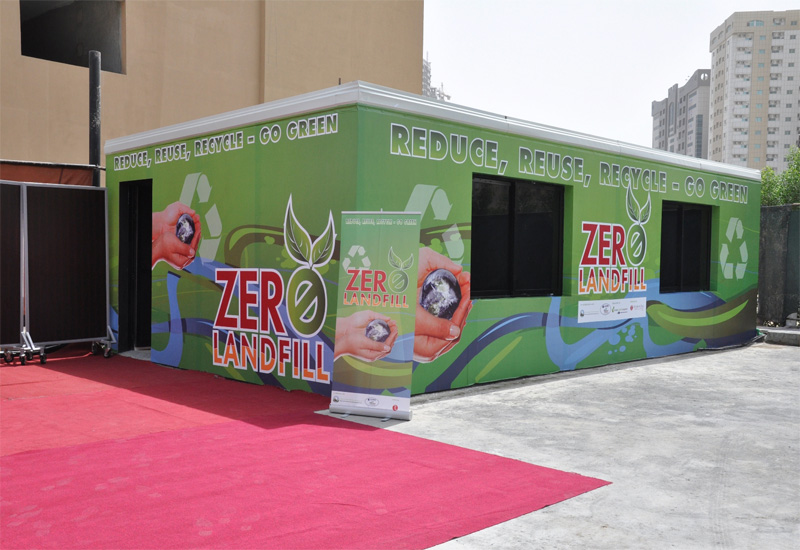TRASH TECHNOLOGY
To surmount this array of problems, hotels are increasingly turning to a growing range of modern waste management technology and procedures including waste collection cages, sorting rooms and waste compactors.
This has allowed hotels to potentially reduce the number of waste collections throughout the week, as recyclable waste is sorted out of the system and collected separately, with any remaining waste compacted to reduce the need for storage space and the number of necessary collections.
One hotel group which has been making particular efforts to manage its levels of waste is Hilton Worldwide, which recently set itself the goal of reducing overall waste across the group by 20% within five years, as well as a 20% cut in CO2 emissions and 10% in water usage.

| Advertisement |
The Hilton Abu Dhabi recently ran a range of initiatives including staff and guest awareness programmes on the importance of separating recyclable and disposable rubbish, a desert cleaning drive and even a recycling fashion show where staff were asked to create outfits made of recycled materials.
However, Hilton Abu Dhabi‘s environment, health, safety and hygiene manager Evangelos Karakoulias explains that “while Hilton is pushing its hotels to maximise its waste reductions as much as possible, the ability of each hotel to recycle its waste is really dependent on the space and resources it has available.”
“I believe that if the Hilton Abu Dhabi was able to recycle food waste, then we could increase our 20% reduction target to somewhere closer to 40%. However, it is difficult to find the space necessary to operate this kind of programme as well as find a use for the quantities of fertilizer that we would be producing,” admits Karakoulias.
GOING GREEN
One hotel that has been able to establish a successful food waste recycling scheme is the Westin Abu Dhabi Golf Resort and Spa, which has recently been piloting a machine that can turn food waste into a highly effective fertiliser in only 10 hours.
Westin Abu Dhabi director of engineering Sebastien Weyer explains that the machine was introduced as a result of the emirate’s Nadafa Programme from the Centre Of Waste Management in Abu Dhabi, with a pilot programme scheduled to see what impact it had on the hotel’s efforts to reduce waste.
“As a result, we have been able to produce a nutrient rich fertilizer, which is 93% organic matter that we can use across our resort. This, therefore, becomes an additional cost saving measure as our landscaping team no longer needs to purchase fertilizer,” says Weyer.
According to Weyer, it’s initiatives like this that have allowed Starwood Hotels & Resorts to set a target to reduce energy consumption by 30% and water consumption by 20% across all of its hotels by 2020.
Another hotel currently applying a successful waste management system in the region is the Ramada Hotel & Suites Ajman, which has recently launched its new ‘Zero Landfill’ initiative, whereby it is aiming to recycle or reuse more than 90% of its entire waste in order to never have to send its waste to a landfill again.
Ramada Hotel & Suites Ajman general manager Iftikhar Hamdani explains that “when we first looked at our waste management systems, we quickly realised that the hotel was producing close to an average of one tonne of waste a day. We had between five or six skips scattered around the hotel, and we were also paying close to AED 150,000 ($41,000) to a waste management company just to take our waste away every year.”
The hotel’s conservation efforts saw the northern emirate property partner with the AIMS Group environmental solutions provider and Green Mountain Waste Management to launch an initiative in 2012 to reduce the hundreds of kilos of waste the hotel produced each day, most of which came from food and organic matter.
“The amount of land needed to dispose of the heaps and heaps of waste produced by hotels every day is one of the major ecological concerns for our region.
“Before we began the ‘Zero Landfill’ initiative, our waste was 60% from the kitchen, and we felt that we could really tackle that figure by using a special composter. We therefore made the decision to purchase the composting unit, even though the cost was high, which was initially a challenge to convince our group management of the potential benefits,” adds Hamdani.
Eventually, however, the cost benefits for the Ramada Ajman from using the composting system, which reduced the hotel’s daily waste from 800 to 1000kg, began to speak for itself and the hotel’s waste management system was recently commended by Dubai Municipality during a recent visit.
“We are very pleased with the commendation given by the Dubai Municipality for our Zero Landfill project, which shows that the public has started to recognise our environmentally friendly programmes that benefit both our property and our country.”
Article continues on next page ...









 Search our database of more than 2,700 industry companies
Search our database of more than 2,700 industry companies









